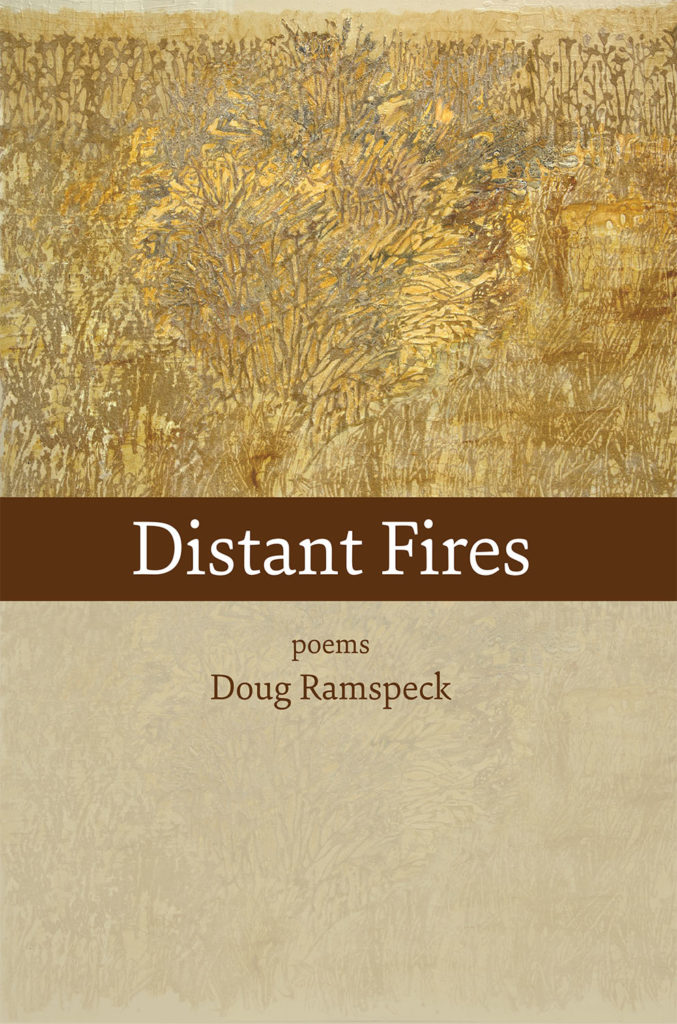Distant Fires
 Title: Distant Fires
Title: Distant FiresPublished by: Grayson Press
Release Date: 2020
Genre: Drama, Fiction, Poetry
ISBN13: 978-1-7335567-7-4
Buy the Book: Grayson Books, Amazon, Barnes & Noble
Overview
Robert Cording, who selected Distant Fires for the 2019 Grayson Books Poetry Prize, writes this about the collection: “Distant Fires is a deeply moving book about the relationship between two brothers, one of whom was involved in the death of two women, was imprisoned, and died. The book reverberates with the voice of the dead brother, which the author must put into words, both to exorcise his guilt over not being able to help his brother and, more importantly, to give his dead brother, a confessed murderer, humanity and a human voice. The book succeeds in doing so artistically and with great passion.”
Praise
“The artist, John Baldessari, observed, ‘Great art is clear thinking about mixed feelings.’ In the intense and compelling collection, Distant Fires, Doug Ramspeck reveals how the heart persists in loving even those who are unlovable. For the narrator, his brother is a puzzle he cannot abandon but never solve. Knowing that suffering needs to be shared to become transformative, Ramspeck describes his older brother who threatens to kill him by holding a gun to his neck and who shoots the cat of the old woman next door. In poems about his father and brother’s cruelty, trauma that harrows the narrator does not desensitize him. A section of letters from the brother where he describes his life spreading ‘out like some great and endless sea’ demonstrates the complexity and sensitivity that cause the narrator to love his brother in spite of actions that should padlock the heart. It is only in the dialogue of the final dramatic section that the narrator is silenced and has no words to offer his brother. Ramspeck’s arresting language never wilts because it is muscular yet supple, woven with a tapestry of detail from the natural world: Snow falls from a scrim of sky; willows are dreadlocked and clouds are transformed to a skull. Nouns sprout into verbs as the reader watches a crow oar away. Ramspeck is also a master of metaphor. When the brother is apprehended for the murder of his girlfriend, he compares himself to a crow who was dead yet wings twitched and fluttered in the wind. Fists and bullets in the poems penetrate the flesh but it is Doug Ramspeck’s words in Distant Fires that enter and remain in the heart.”
—Vivian Shipley, Connecticut State University Distinguished Professor and author of An Archaeology of Days, Negative Capability Press, 2019
Sample Poem
Shell Casings
I will arise and go now . . .
-W. B. Yeats
My brother would line up the bullets
on the back porch and arrange them
in such an exact formation that I was
almost sad when he pushed the first one
into the chamber and I watched
the .22 casing fly, watched the tin can
jump or the blue jay become a confetti
of feathers or the squirrel drop
from its high limb to convulse
on the grass before growing still.
But when my brother shot Ralph,
the neighbor’s cat, and we buried him
near my mother’s tomato plants,
I kept remembering as we dropped his limp
body into the hole how he would rub
against my legs each time I crossed
into the next yard to ask Mrs. Orlen
if she needed her lawn cut or her weeds
plucked or her driveway shoveled.
For days we heard Mrs. Orlen
alternately calling Ralph Ralph
then Kitty Baby Kitty Baby, which
I found myself remembering last summer
when my own cat was dying slowly
of kidney failure. In Spike’s final weeks,
I carried him sometimes out the back door
so we could lie together by the pond,
and I would look up at the old world
of the sky while he studied a dragonfly
flitting atop the quiet green waters.
Or I would run a hand across his fur
and recite—as best I could—the lines
from “The Lake Isle of Innisfree,”
which he seemed to appreciate,
more or less, and I spoke the words again
on the afternoon we buried him not far
from my wife’s tomato plants. And as I
gripped the shovel, I remembered
how those casings would be warm
to the touch after having flown toward me
on the porch, and how Spike’s fur collected
and hoarded the heat of the sun as he lay
with his eyes closed. And I recalled
my long dead brother touching a hand
to my shoulder as we stood above the grave,
and how he told me to go inside, to let him
finish up, that it was all okay, that everything
was okay, to trust him . . . it was okay.